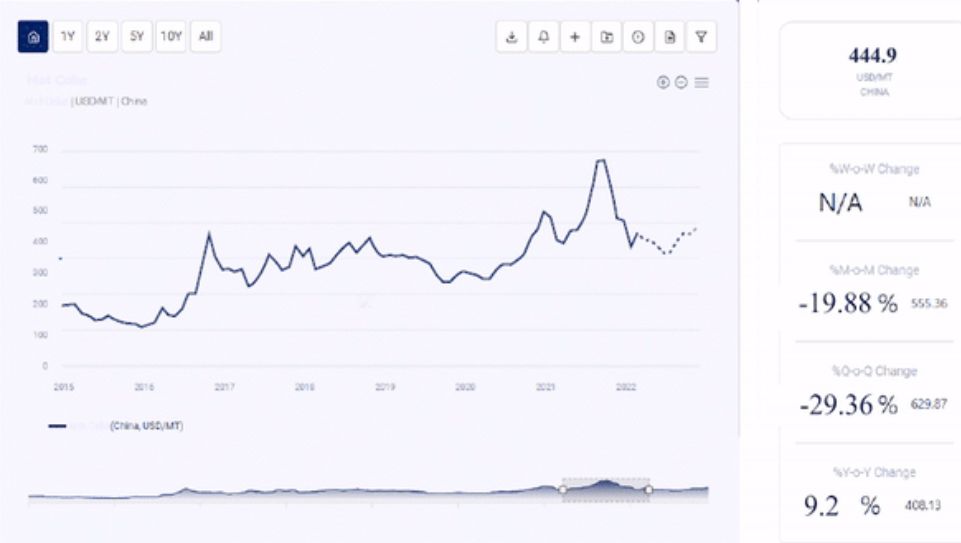The price trend of corn gluten meal in the first two quarters of 2023 depended on corn production and global supply. Production gained momentum but lagged behind inflation rates. Sluggish demand and excess production during the rabi season led to price depreciation. Economic challenges in Europe and the US, marked by high inflation and bank interest rates, contributed to a recession-like phase, further affecting corn gluten meal prices.
Request for Real-Time Corn Gluten Meal Prices: https://www.procurementresource.com/resource-center/corn-gluten-meal-price-trends/pricerequest
Definition
Corn gluten meal is a byproduct of corn processing, rich in protein and amino acids. It’s commonly used as an animal feed ingredient due to its nutritional value. This yellowish powder contains around 60% protein and is gluten-free, making it suitable for various animals, including poultry, cattle, and aquaculture. Its protein content aids in growth and muscle development. Additionally, corn gluten meal has weed suppressive properties, as it inhibits seed germination, making it useful in organic gardening and turf management to prevent weed growth.
Key Details About the Corn Gluten Meal Price Trend:
Corn gluten meal is a byproduct of the corn milling process used primarily in animal feed and as an organic herbicide. The price trends for corn gluten meal can be influenced by several factors:
- Corn Prices: As corn gluten meal is derived from corn, its price is often directly influenced by the price of corn, which can fluctuate based on weather conditions, crop yields, and changes in demand for corn-based products.
- Supply and Demand: The balance between supply and demand significantly impacts prices. Increased demand for corn gluten meal in feed markets or as a herbicide can drive prices up, especially if supply is constrained.
- Energy Costs: Since processing and transporting corn gluten meal is energy-intensive, fluctuations in energy prices (like oil and gas) can affect its price.
- Agricultural Policies: Government policies, including subsidies, tariffs, and biofuel mandates, can influence corn markets and, by extension, corn gluten meal prices.
- Global Trade: The global trade environment can also impact prices. For instance, trade barriers or increased export activity to countries where corn gluten meal is in higher demand can elevate prices.
- Economic Conditions: General economic conditions, including inflation rates and economic growth, can influence commodity prices, including those of corn gluten meal.
Tracking these trends can provide insights into potential price movements and help stakeholders make informed decisions regarding the purchase or use of corn gluten meal.
Industrial Uses Impacting the Corn Gluten Meal Price Trend:

Corn gluten meal, a byproduct of corn processing primarily used in animal feed and as a natural herbicide, has its price influenced by various factors in industrial uses. Here are some key aspects:
- Animal Feed Demand: Corn gluten meal is a high-protein supplement in animal feeds. The demand from the livestock industry, including poultry, swine, and cattle, significantly impacts its price. An increase in meat consumption or changes in livestock feed formulations can drive up the demand and price of corn gluten meal.
- Biofuel Production: Corn, including corn gluten meal, is used in the production of biofuels like ethanol. The biofuel industry competes with the feed industry for corn resources. When biofuel production increases, it can tighten the supply of corn and corn byproducts, including corn gluten meal, potentially raising prices.
- Agricultural Practices: As a natural pre-emergent herbicide, corn gluten meal is used in organic farming to control weeds. Trends towards more organic and sustainable farming practices can increase the demand for natural herbicides, impacting the price.
- Global Supply Chain Issues: Changes in global trade policies, tariffs, and supply chain disruptions can affect the availability and cost of corn gluten meal. Events like trade wars or pandemics can disrupt supply chains and influence prices.
- Economic Conditions: General economic conditions, including inflation rates and currency fluctuations, can impact the cost of commodities like corn gluten meal. For instance, a weaker dollar can make U.S. corn products cheaper overseas, potentially increasing demand and prices.
Understanding these factors helps stakeholders in industries such as agriculture, biofuels, and food production navigate and strategize around the volatile pricing of corn gluten meal.
Key Players:
- ADM
- Prorich Agro Foods
- Tate and Lyle
- Badger State Ethanol LLC
- Vijaya Enterprises
- Paramesu Biotech Private Limited
About Us:
Procurement Resource offers in-depth research on product pricing and market insights for more than 500 chemicals, commodities, and utilities updated daily, weekly, monthly, and annually. It is a cost-effective, one-stop solution for all your market research requirements, irrespective of which part of the value chain you represent.
We have a team of highly experienced analysts who perform comprehensive research to deliver our clients the newest and most up-to-date market reports, cost models, price analysis, benchmarking, and category insights, which help in streamlining the procurement process for our clientele. Our team tracks the prices and production costs of a wide variety of goods and commodities, hence providing you with the latest and consistent data.
To get real-time facts and insights to help our customers, we work with a varied range of procurement teams across industries. At Procurement Resource, we support our clients with up-to-date and pioneering practices in the industry to understand procurement methods, supply chains, and industry trends so that they can build strategies to achieve maximum growth.
Contact Us:
Company Name: Procurement Resource
Contact Person: Chris Byrd
Email: sales@procurementresource.com
Toll-Free Number: USA & Canada – Phone no: +1 307 363 1045 | UK – Phone no: +44 7537 132103 | Asia-Pacific (APAC) – Phone no: +91 1203185500
Address: 30 North Gould Street, Sheridan, WY 82801, USA

